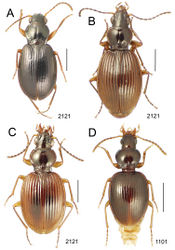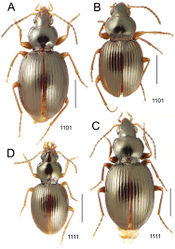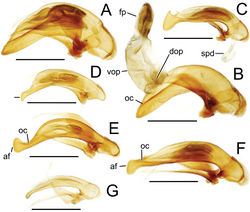Mecyclothorax sabulicola
| Notice: | This page is derived from the original publication listed below, whose author(s) should always be credited. Further contributors may edit and improve the content of this page and, consequently, need to be credited as well (see page history). Any assessment of factual correctness requires a careful review of the original article as well as of subsequent contributions.
If you are uncertain whether your planned contribution is correct or not, we suggest that you use the associated discussion page instead of editing the page directly. This page should be cited as follows (rationale):
Citation formats to copy and paste
BibTeX: @article{Liebherr2013ZooKeys322, RIS/ Endnote: TY - JOUR Wikipedia/ Citizendium: <ref name="Liebherr2013ZooKeys322">{{Citation See also the citation download page at the journal. |
Ordo: Coleoptera
Familia: Carabidae
Genus: Mecyclothorax
Name
Mecyclothorax sabulicola Britton, 1948: 113 – Wikispecies link – Pensoft Profile
- Thriscothorax minutus Britton, 1938: 106 (junior homonym; Britton 1948[1]).
Identification
Of the three Tahitian species in the Mecyclothorax globosus group with only the posterior supraorbital seta and no dorsal elytral setae – setal formula 1101 (Figs 37D, 39A, B) – individuals of this species exhibit the most well-developed microsculpture. The head is covered with a distinct isodiametric mesh, the sculpticells elongate when associated with transverse wrinkles on the frons. The pronotal disc has a well-developed transverse mesh over the entire surface, the sculpticells visible in areas of reflected light, and the discal elytral intervals are lined with transverse microsculpture, a mixture of transverse mesh and transverse lines. The pronotal base is broad (Fig. 39B) and the pronotal laterobasal depressions shallow with a median tubercle. The elytra are broad basally, the lateral margins extended laterally beyond obtusely subangulate humeri. The eyes are moderately convex, ocular ratio 1.42, with a horizontal diameter crossing a maximum of 14 ommatidia. The male aedeagal median lobe is gracile, the shaft of the same diameter from basal bulb to ostium (Fig. 40G). The lobe apex is expanded downward, resulting in an asymmetrical apical expansion and an oblique apical face. In this regard the aedeagus looks like a less exaggerated version of the aedeagus of Mecyclothorax arboricola (Fig. 40F). Standardized body length 3.5–3.6 mm.
Distribution and habitat
This species is the geographically most widespread Tahitian Mecyclothorax, recorded from Monts Marau, Aorai, and the lower reaches of the Piti Hiti massif. Elwood Zimmerman collected the type series along the sandy shore of a small pond at 1200 m elevation on Aorai. I have examined three specimens in the Perrault collection from Aorai, 1000–1900 m elevation, and five specimens from Marau, 900–1400 m elevation. Perrault’s Pito Hiti massif localities for this species lie along the ridge from Supermahina upwards to Pihaaiateta; two specimens are labeled 1000 m elevation, and two labeled 900–1200 m.
Taxon Treatment
- Liebherr, J; 2013: The Mecyclothorax beetles (Coleoptera, Carabidae, Moriomorphini) of Tahiti, Society Islands ZooKeys, 322: 1-170. doi
Other References
- ↑ Britton E (1948) A revision of the Hawaiian species of Mecyclothorax (Coleoptera: Carabidae). Occasional Papers of Bernice P. Bishop Museum 19: 107-166.
Images
|


